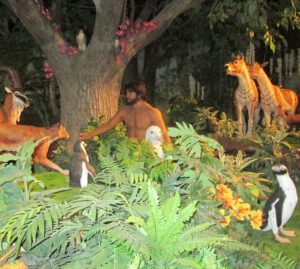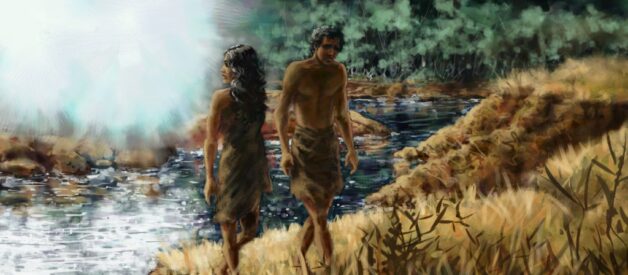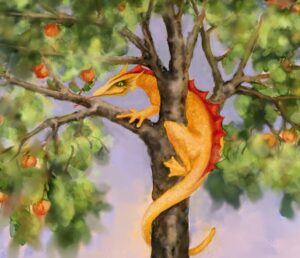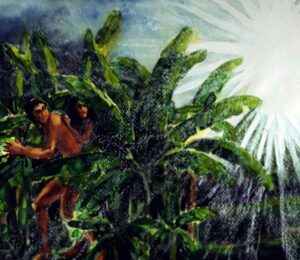Do you know how much God loves you? He loves you so much that he banished Adam from the Garden of Eden.
Yes, you read that right, and you’re probably scratching your head. How is that loving? And what does Adam have to do with me, anyway?
First of all, Adam was our earliest ancestor, the first of all mankind. Since he represented all of us, the way God related to him shows how he relates to us as well.
But how could driving Adam out of his beautiful home and sentencing him to “painful toil…all the days of your life” (Genesis 3:17) be an act of love? “So the Lord God banished him from the Garden of Eden to work the ground from which he had been taken” (Genesis 3:23).

Let’s go back to Adam’s beginning. When God created him, he placed him in a garden he had planted in Eden. Eden means “delighted.” Culturally and historically, Eden “symbolizes a state of perfect harmony, abundance, and communion with God” (Strong’s Lexicon).
The garden was filled with everything Adam could need or want for a perfect life. God made “trees that were pleasing to the eye and good for food” (Genesis 2:9). Adam enjoyed all the living creatures God had created (v.19). Then God made a special companion for Adam, his wife (v.22). And best of all, God himself was there.
In the middle of the garden were two special trees. “16And the Lord God commanded the man, ‘You are free to eat from any tree in the garden; 17but you must not eat from the tree of the knowledge of good and evil, for when you eat of it you will surely die’” (Genesis 2:16-17). God prohibited Adam from eating the fruit of only one tree: the tree of the knowledge of good and evil.
The Hebrew word for knowledge “encompasses both intellectual comprehension and experiential knowledge.” Here it “implies a deep, intimate understanding that goes beyond mere factual information” (Strong’s Lexicon).
Adam and Eve were aware of right and wrong because they had been commanded not to eat from this particular tree. But when they were deceived and they ate from the tree, they experienced sin in a personal way for the first time. It had nothing to do with the fruit itself. Rather, they had disobeyed God, which brought sin into their lives and into the world. The perfect relationship they’d had with God was immediately broken.
It is here that God sent Adam out of the garden—and where we find out how much God loves us.
The other tree growing in the middle of the garden was the tree of life. Adam had had access to it all along. If they had eaten from it, they would have personally experienced eternal life, which is what God had planned for his human creation—living forever with him in an untarnished world. God never wanted us to experience evil for ourselves.
But now Adam had—and the tree of life was still accessible. That is why God said, “The man has now become like one of us, knowing good and evil. He must not be allowed to reach out his hand and take also from the tree of life and eat, and live forever” (Genesis 3:22). If they ate from the tree now, they would live eternally, but it would be in their sinful state, and therefore, forever separated from God. God loved them too much to allow that.
So “he drove the man out” and “he placed on the east side of the Garden of Eden cherubim and a flaming sword flashing back and forth to guard the way to the tree of life” (Genesis 3:24). Drove out is from the Hebrew word meaning “to drive out, to expel, to cast out.” It “conveys a forceful removal or separation, often with a sense of urgency or necessity” (Strong’s Lexicon).
God had to keep Adam and Eve from the tree to keep them from an eternity separated from their Creator who loved them. He wasted no time in removing them from the danger. Then he ensured that they, and all who would come after them, would never have access to the tree of life in their sinful state. He posted angel guards at the entrance, wielding flaming swords that were in constant motion.
God still had plans for an eternal life for his people, though. And it would have a glorious outcome that the tree in the garden could not provide for the time being. The tree of life still exists; it appears again in the book of Revelation where Jesus says, “Blessed are those who wash their robes, that they may have the right to the tree of life and may go through the gates into the city” (Revelation 22:14).
All who are redeemed from their sin by the blood of Jesus will regain access to the tree of life. They will enter through the gates into that eternal life and dwell forever in the presence of God—as God intended.
If God had not banished Adam from the garden, Adam would surely have eaten from the tree of life, thereby sentencing himself—and you—to eternal separation from God. But in his love for you, God preserved the tree of life so you can make your own choice.
That’s how much God loves you!
Scripture quotations are from NIV.
Feature image by Carolyn Dyk/Wycliffe Bible Translators






Brenda+Murphy
February 4, 2025It is incredible that God loves us so much. The ways he shows it are too many to count. Thanks for pointing out this act of love that we don’t usually recognize. 🙂
Bonnie
February 4, 2025You are welcome, Brenda. You’re right. It’s easy to miss what could have happened if Adam had been left in the garden. God sees everything and always has the best plan! And it always comes from His love.
marilyn
February 10, 2025Our wonderful God is all about redemption! I will never understand why Adam and Eve listened to Satan…They had no sin nature yet. They lived in perfect harmony with God and still Satan was able to deceive Eve into believing that God did not have her best interest at heart. This is a cautionary tale. We now have to contend with the deceiver hampered with a sin nature that wants its own way rather than God’s way. How can we manage such a scenario? Only through our wonderful Redeemer! I give Jesus all the praise for my redemption.” Now the judgment is upon this world; now the ruler of this world will be cast out.” John 12:31.
Bonnie
February 10, 2025Amen, Marilyn!
I’ve been sitting here thinking about what you said. It is hard to understand why Adam and Eve would even be tempted when they had a perfect relationship with their Creator, when all they had ever experienced was good, right, excellent. Maybe it’s because, even though man was created perfect (“very good”), he still was given choice.
God’s character is good and will not–and cannot–ever change. But I don’t think man was perfect in the same way God is. He was only created perfect by the uncreated Perfect One. I’m just “thinking out loud” here.
But as you say, Jesus is our Redeemer. He was never going to leave us in our sin if we will accept Him!